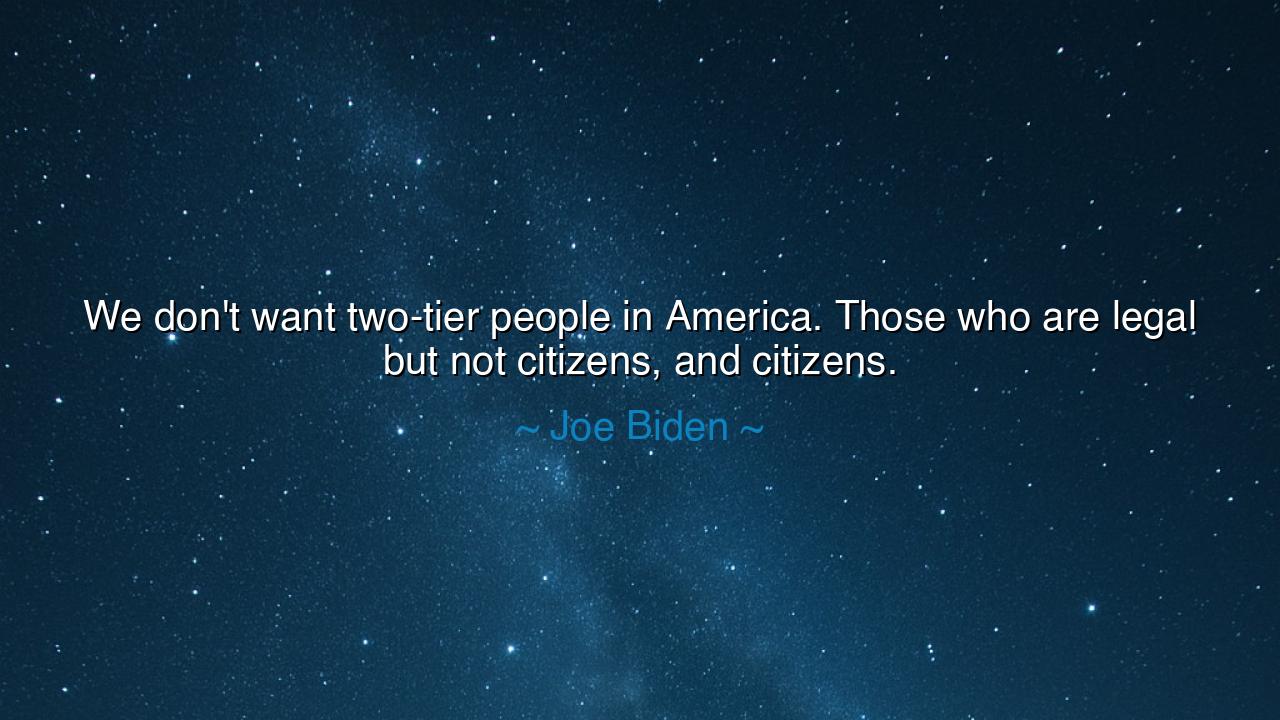
We don't want two-tier people in America. Those who are legal but
We don't want two-tier people in America. Those who are legal but not citizens, and citizens.






Hear now the words of Joe Biden, spoken with the gravity of a man who has witnessed the struggles of his people: “We don’t want two-tier people in America. Those who are legal but not citizens, and citizens.” This saying is a cry against division, a warning against the creation of a society fractured into classes of belonging. It is not a matter of law alone, but of dignity, for when a nation grants the right to live upon its soil, it must also ask: shall these souls walk as equals among us, or shall they forever be marked as lesser?
When Biden speaks of two-tier people, he invokes a danger that echoes across the ages. Throughout history, societies that divided men into higher and lower castes sowed seeds of unrest and bitterness. To permit some to labor, pay taxes, and live in the community, but deny them full membership, is to create a silent wound in the nation’s heart. Such a wound festers; it breeds alienation and resentment. And no republic, however mighty, can stand long upon foundations built on inequality.
The contrast between legal residents and citizens is not merely a question of papers or documents, but of belonging and identity. To be legal is to be tolerated; to be a citizen is to be embraced. A legal resident may live under the law, but a citizen shares in shaping the law. A legal resident may work, but a citizen’s voice counts at the ballot. Thus, the gulf between the two is not of shadow and light, but of silence and speech, of passivity and power. Biden’s words declare that such a gulf must not define America.
History offers us examples of this truth. Consider the story of the Naturalization Act of 1924, which granted citizenship to Native Americans born within the United States. For centuries, these peoples lived on the same land, fought in the same wars, and paid the same costs of survival, yet were denied the rights of citizenship. Only after relentless struggle did the law recognize them as full members of the nation. Their tale shows us the injustice of two tiers, and the healing that comes when the barrier is finally broken.
The words also carry an aspirational power: that America’s strength has always come from the widening of its circle. The immigrants who arrived from Ireland, Italy, Mexico, Africa, and Asia brought not division but renewal. When they were embraced as citizens, they did not weaken the republic—they made it more resilient, more diverse, more capable of fulfilling its destiny. To shut them out, to leave them forever as “legal but not citizens,” would be to deny America the very lifeblood that has carried it forward.
The lesson of Biden’s saying is clear: a nation divided into tiers is a nation divided against itself. To honor the dignity of those who share our neighborhoods, who build our homes, who fight in our armies, we must open the path to full inclusion. Citizenship is not a gift to be hoarded; it is the recognition of humanity’s shared worth. To refuse it where it is due is to weaken the spirit of democracy itself.
Children of tomorrow, learn this wisdom: do not fear those who come from beyond your borders, for they too seek safety, dignity, and belonging. Instead, seek to understand their journey, to welcome them as equals, and to support leaders who defend inclusion over division. In your daily lives, stand against any voice that seeks to create first-class and second-class persons, for such a world is not liberty but bondage in disguise.
And so, let the teaching endure: that in the land of freedom, there shall be no two-tier people, but one people—diverse, imperfect, yet bound together in common purpose. For unity is not found in sameness, but in shared belonging, and citizenship is the seal that makes the many truly one.






AAdministratorAdministrator
Welcome, honored guests. Please leave a comment, we will respond soon